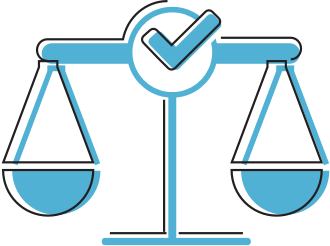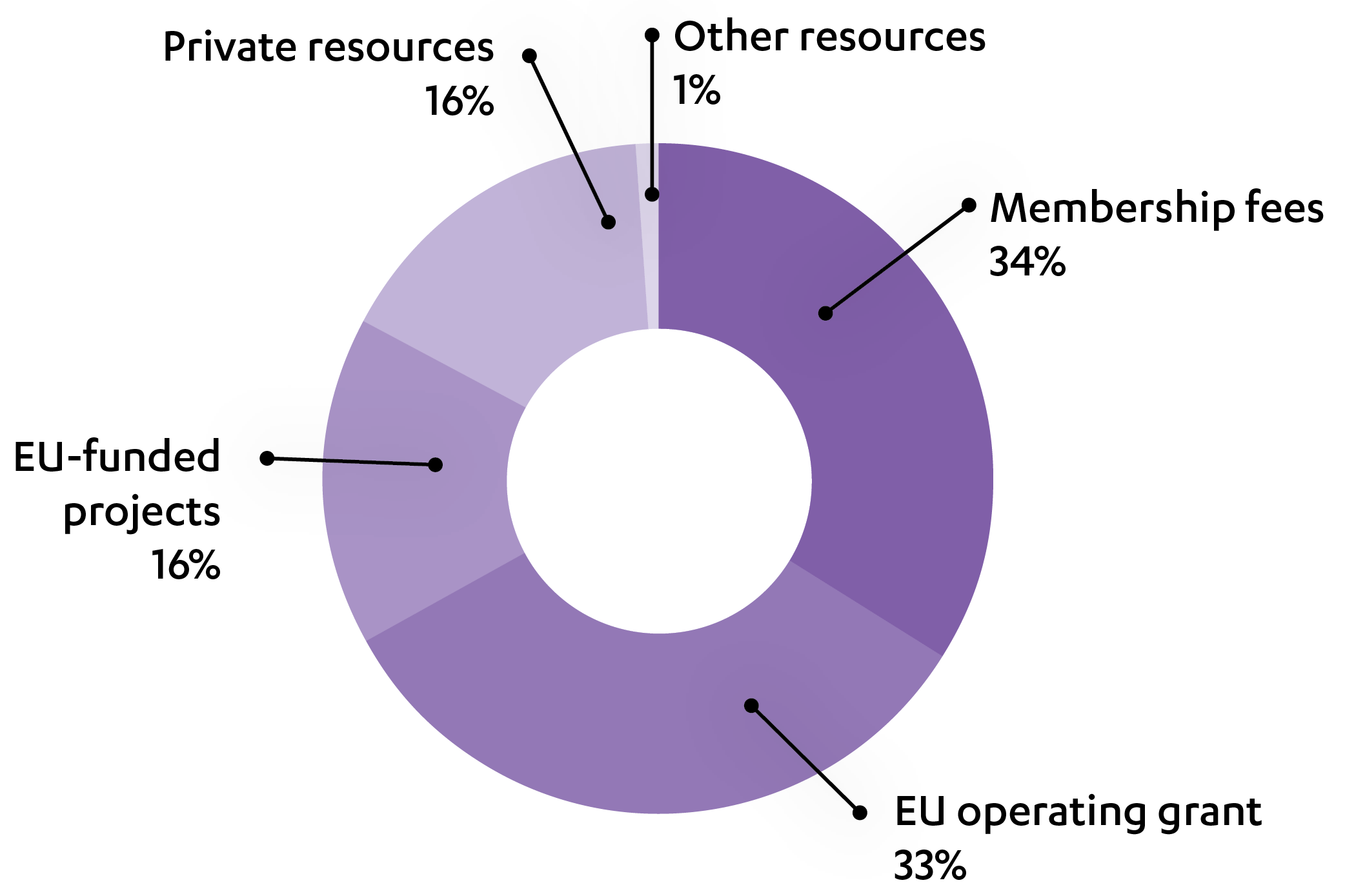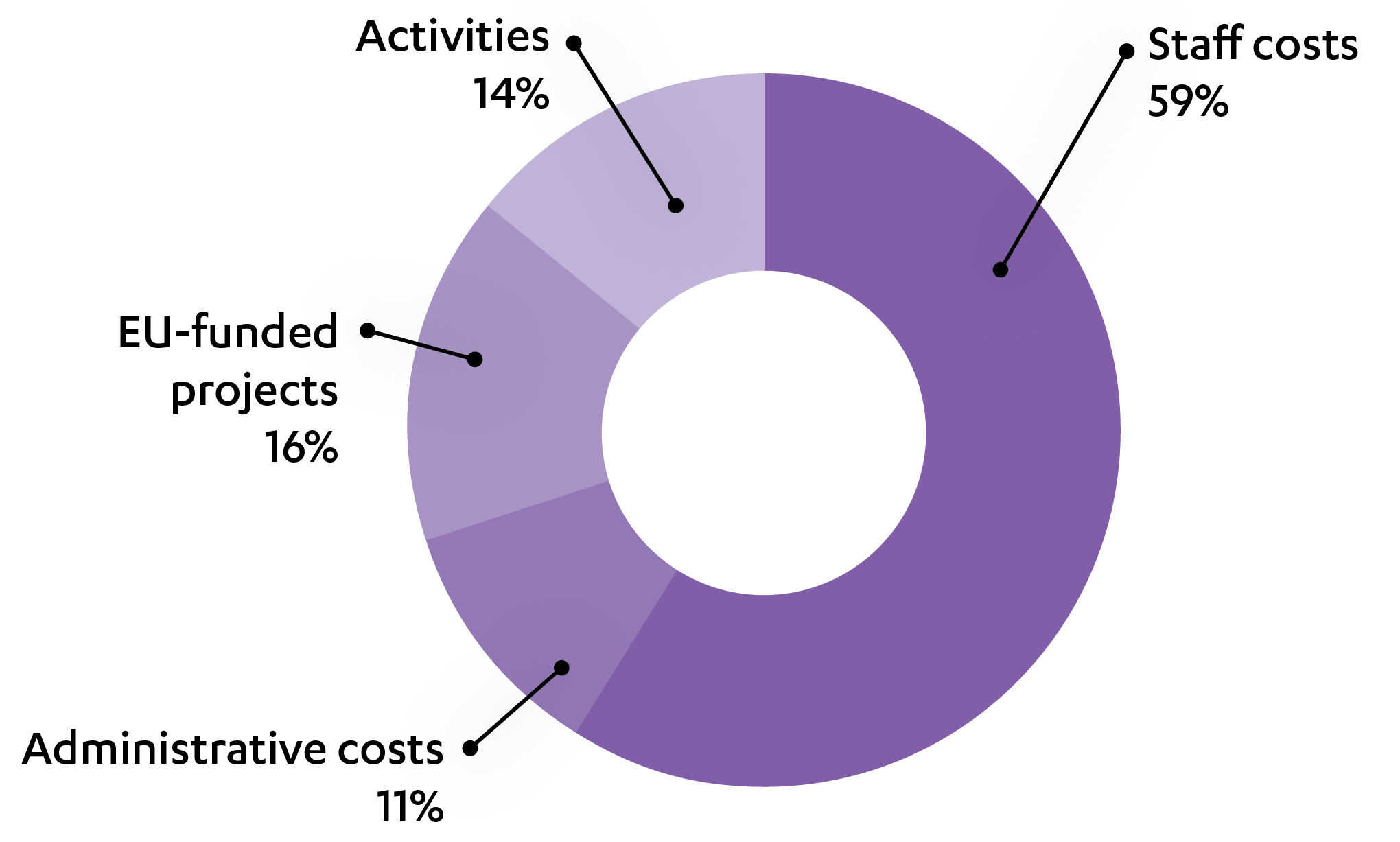

Monique GoyensDirector General

Örjan BrinkmanPresident
We are writing this report exactly one year after Europe faced its first COVID ‘lockdown’. It is now spring 2021 and vaccination campaigns have powered up across the world. A timely moment to reflect on how the past year has had a major impact on our lives. At the start of the year, nobody could have foreseen the pandemic’s far-reaching consequences. But we have navigated them as they arose.
Our members – national consumer groups – sprang into action and informed stranded consumers about their rights, fought for those suddenly struggling to pay their loans or heating bills, and denounced scam products. The impact of COVID on EU policy immediately dominated the Brussels agenda. For instance, our consumer rights experts took on public authorities and companies trying to suspend or ignore travellers’ rights amidst the pandemic. The logic was lost on us: since when are rights only for business-as-usual times? As you might expect, we fought back and consumers kept their right to be reimbursed for cancelled trips.
COVID impacted everything. It sped up the adoption of digital health tools, changed mobility habits, and led to debates about global supply chains. And of course, it showed the need to ensure access to safe, effective and affordable vaccines for all, and spurred a rethink about how health research is financed. So, in times of crisis, we saw that consumer policy really constitutes the core of a well-functioning European Single Market.
But 2020 brought more than COVID. After over thirty years of consumer advocacy, a historic deal was reached on an EU collective redress law. The year’s events also showed us the need to always press ahead and advocate for a better tomorrow. Digitalisation’s unstoppable pace and the climate crisis – which might upstage this pandemic if we fail to act – did not take a break. Which is why we took a close look at the EU’s promising legislative efforts to address major societal challenges.
For example, the EU’s New Consumer Agenda reflects a long-standing demand by consumer organisations to focus on enforcement, enforcement, and more enforcement. Other strategies unveiled in 2020 should direct Europe towards more sustainable products, better nutrition labelling, artificial intelligence that we can trust, homes that are more energy efficient, less harmful chemicals in our environment, and more affordable medicines. That is, provided the EU translates these plans into effective laws. And this is far from an exhaustive list of consumer themes that require legislative action. BEUC and its members will scrutinise all of these plans so that they are not watered down or neutralised by pressure on policy makers from narrow, vested interests.
Our final reflection about 2020 is that regulators must look beyond Europe and address global challenges. One of these is the widespread availability of dangerous products. Research by our members and sister organisation ICRT found that two-thirds of 250 products bought from online marketplaces fail safety tests. To tackle this problem, we need marketplaces to be made liable for the products sold on their websites by traders who might be based anywhere in the world. It also requires authorities to keep their eyes on the ball and act in coordination with their partners.
Our conclusion? Whatever life might throw at us, consumer advocacy is never dull.

As COVID hit, nearly 20 EU countries tried to temporarily suspend traveller rights under EU law to a refund for cancelled trips, and instead impose vouchers. We subsequently supported the European Commission when it reminded EU countries that they were obliged to uphold the right to reimbursement for trips cancelled due to COVID-19. The Commission also proposed how best to offer voluntary vouchers to consumers.
In June, the EU institutions reached a historic deal on an EU-wide collective redress law (the EU Directive for ‘Representative actions for consumers’). Access to justice for consumers will, as a result, significantly improve in most EU Member States. For consumers, going to court as an individual – especially when facing a deep-pocketed multinational – is often an insurmountable barrier. It is especially positive that collective redress will be possible in a wide range of areas. Consumers will be able to lodge group actions when companies break laws on a range of issues including passenger rights, health services, financial services, data protection and product liability. In December, the Directive was published in the Official Journal of the EU and came into force, obliging all Member States to have collective redress procedures.
Throughout the year, BEUC engaged with the European Commission on plans to improve the digital landscape in Europe as regards both services and how gatekeeper companies operate. As a result, the two long-awaited proposals put forward by the Commission in December (called the Digital Services Act and Digital Markets Act) to make digital players more accountable, protect consumer rights and lead to more choice of innovative digital services already incorporate some of the recommendations made by BEUC. For example, the Commission has proposed that platforms would be obliged to verify that businesses using their services are genuine. BEUC’s focus is now on the European Parliament and the Council to improve the proposals and close a number of loopholes during the process of adoption.
‘Net neutrality’ allows users to enjoy the freedom to access the content, services, and applications of their choice, using any device they choose. BEUC works to ensure that the openness and neutrality of the Internet is respected and protected by all players. In June, the Body of European Regulators for Electronic Communications (BEREC) updated its guidelines for net neutrality. In doing so, it took on board many of our recommendations. For example, it will be more difficult for Internet access providers to use commercial agreements to exclude specific services from consumers’ monthly data allowances (‘zero-rating’).

As the COVID-19 pandemic took over the world, we launched a COVID-19 and consumer policy web page to bring together information about the actions of our network. The page illustrates the pandemic’s broad fall-out. This ranged from excessive prices to problems with paying energy bills and repaying loans, changed mobility habits, supply chain issues breakdowns and more. Upholding passenger rights proved a significantly busy file for us. This is best illustrated by our ‘Voucher Gate’ report, which evaluates EU and national measures to help consumers affected by travel cancellations.
Our survey showed that most EU consumers are open to eating more sustainably but face hurdles in doing so. The survey – run by 12 BEUC members across 11 countries – asked people on a multitude of sustainability aspects. These included: How much attention do you pay to the impact of your food choices on the environment? Are you willing to cut down on red meat? Is the government doing enough to promote sustainable food? Our main take-aways centred on factors such as ‘price’, ‘willingness to change’ and ‘meat and dairy’. This action generated close to 200 quotes in media across over 15 countries and was widely disseminated to key EU policymakers and food chain actors. Do also read the full report: One bite at a time – Consumers and the transition to sustainable food.
Six consumer groups from the BEUC network tested 250 electrical goods, toys, cosmetics and other products bought from online marketplaces such as Amazon, AliExpress, eBay and Wish. They selected the products based on possible risks and found that 66% of them fail EU safety laws with possible consequences such as electric shock, fire or suffocation. Products included smoke and carbon monoxide alarms that did not detect smoke or carbon monoxide, toys that contained chemical levels 200 times over the limit, and a power bank that melted during testing. Following this research, we called for online marketplaces to be made liable for dangerous products sold on their sites. The tests were coordinated by our sister organisation International Consumer Research and Testing (ICRT).
Consumers believe that artificial intelligence (AI) can bring benefits, we discovered from a survey conducted by nine consumer groups in the BEUC network. However, when asked to evaluate the added value of a number of specific services which already use AI technology today – such as home virtual assistants or advertisements on e-commerce sites – most respondents were not convinced. Many respondents said they did not think that current legislation was adequate to effectively regulate AI-based activities. Just one-fifth of respondents said that current rules protect them from potential harm caused by AI. EU plans for a law on AI therefore are very much in line with people’s expectations. Do also read the full report: Artificial intelligence: what consumers say.
We joined forces with 39 stakeholders from across the policy spectrum (national consumer groups, policy makers, academics, food companies and retailers) to call for #NutriScoreNow. In a joint letter, we urged the European Commission to make the nutrition label Nutri-Score mandatory in the EU. The call was backed by a social media campaign including a video and visuals illustrating how useful Nutri-Score was in helping consumers to quickly spot healthier options within a food product category.
We successfully advocated to maintain the use of meaty names for vegetarian alternatives – such as ‘soy sausage’ – because they help consumers shift to more plant-based diets. Our reaction in November to the European Parliament’s vote on the matter generated an avalanche of quotes in the media, including in influential outlets such as the Financial Times, El País, Le Figaro, and Die Presse.
11 consumer groups from the BEUC network asked 11,273 consumers to contrast their mobility habits before COVID-19 with those in October 2020. The results showed a drop in use of public transport and a general uneasiness about situations where people come into close proximity with one another. Beyond the pandemic, people expect to use individual forms of transport (bikes, cars) more than before it started. We therefore called upon decision-makers to boost cycling through more dedicated infrastructure, to mitigate an untenable surge in car use, and to counter lingering hesitation around the use of public transport. Do also read the full report: Mobility habits following COVID-19.
2020 was the year when the United Kingdom formally left the EU (in January) and the European Single Market altogether (on 31 December). But the EU and UK are not lifting their anchors and floating off into opposite directions. Proximity dictates that both sides must cooperate. Together with our UK members we therefore urged negotiators to heed the consumer interest. The new EU-UK Trade and Cooperation Agreement proved positive in that it prevents the introduction of tariffs and quotas, provides transparency on air passenger rights, and ensures a high level of food and product safety. We will continue to monitor EU-UK relations in 2021 and beyond.
The constraints of the pandemic meant that we had to bring our events online. This led to the start of our online #ConsumerDebates, which are still ongoing at the time of writing this report. In October, we organised a digital policy event titled How the Digital Services Act can hold online marketplaces to account. Speakers included BEUC member Which?, a Member of the European Parliament, a staff member from the Permanent Representation of Portugal to the EU, an academic, and toy industry representatives.
Our second debate focused on food policy and was titled Food labelling for healthier choices - Towards an EU wide Nutri Score? It featured BEUC members Altroconsumo, Consumentenbond, UFC-Que Choisir and Verbraucherzentrale Bundesverband. We also welcomed speakers from academia, industry, the retail sector and the European Commission. The event was the occasion to explain what Nutri-Score is, how it works, why it is useful to consumers to make healthier choices, and to debunk several misconceptions about the label.

In November, the European Commission adopted a New Consumer Agenda. This lays down its consumer policy objectives and serves as guidance for including consumer interests in all policy areas. We commented that the Agenda – which reflects many BEUC demands – sets the bar high, and that consumer expectations need to be central to any policy plan, be it health, energy, finance or the digital and green transitions. We specifically welcomed that the European Commission wishes to boost enforcement. Lack of enforcement is the Achilles heel of EU and national consumer policy. One way to improve enforcement is for national authorities to work better together with consumer groups.
In response to the European Commission’s artificial intelligence (AI) initiative and data strategy – both presented in February – we called for the EU to put in place safeguards to mitigate risks from AI and data sharing for the EU’s 450 million consumers and to protect their rights in the digital revolution. We requested legally binding EU rules that should 1) establish AI rights for consumers, 2) obligations on companies to be transparent and accountable about their use of AI, and 3) powers for public authorities to ensure AI applications do not expose consumers to harm.
In March, we welcomed the European Commission’s new Circular Economy Action Plan. It constitutes a bold pledge of 35 actions to make consumer products more environmentally friendly, in a bid to better use depleting natural resources. These actions will include important legislative proposals such as a future ‘Sustainable Product Policy Framework’. This should 1) make products durable, reusable, upgradeable, repairable and recyclable, 2) boost the right to repair, 3) protect consumers against greenwashing and more. We underlined that this plan is crucial to make the green transition a reality.
In May, the European Commission unveiled its long-awaited Farm to Fork Strategy for shifting EU food production and consumption onto a more sustainable path. It highlights the importance of being in good health – which is widely defined by what and how much we eat. Moreover, it rightly puts centre stage the need for a more sustainable food system, with greener food production, healthier and more sustainable diets, and less food waste. We called the strategy – which is accompanied by a 27-measure action plan – a “milestone” even though we had hopes for follow-up actions to come sooner. The strategy commits the European Commission to propose a mandatory, EU-wide front-of-pack nutritional label by the end of 2022.
In September, the European Commission unveiled an action plan to mobilise capital by giving savers better investment choices, and businesses more funding opportunities at lower costs. Called the Capital Markets Union Action Plan, it acknowledges consumer organisations’ concerns about the impact of commissions (kickbacks) paid by product manufacturers to financial advisers, which could result in conflicts of interest that negatively affect the quality and objectivity of financial advice. In our view, the EU should look at the UK and the Netherlands for inspiration, where kickbacks have already been banned. This has led to simpler advice for consumers and better value investment products.
In October, the European Commission announced concrete steps to better protect consumers against harmful chemicals − to which they are exposed night and day from multiple sources. That is the central objective of the long-awaited Chemicals Strategy for Sustainability, the first update of the strategy since 2001. Today, most chemicals can be used in consumer products with little actual control. BEUC members frequently detect chemicals of concern such as endocrine disruptors in products ranging from clothes and toys to cosmetics and food packaging. The strategy aims, for example, to minimise exposure to endocrine disruptors and strengthen enforcement of EU chemicals legislation. We urged the EU to walk the talk, as it is no secret that current rules are inadequate and leave consumers exposed to harmful chemicals from dawn to dusk.
We said the European Commission’s Renovation Wave Strategy is good news for consumers, the environment, and the EU economy. Heating or cooling homes represents a major part of households’ energy bills. Investment in energy-efficient buildings is therefore a no-brainer. Consumers will benefit from lower energy bills in the long term, easy access to affordable and trustworthy offers for energy-efficient retrofits, and healthier and more comfortable homes. We urged the Commission to propose measures to speed up building renovation to make people’s homes more affordable, more energy efficient, and more comfortable places to live.
In November, the European Commission published its Pharmaceutical Strategy, which aims to give patients timely access to safe and affordable treatment, and to support medical innovation and pharma competitiveness. We commented on the twin aspects of ‘availability’ (medicine shortages) and ‘price’ (which can skyrocket) and welcomed that the Strategy brings momentum to effectively address these aspects.
Building on lessons learnt from the COVID-19 pandemic, the European Commission in November proposed a Regulation to reinforce the European Medicines Agency’s role in crisis preparedness and management. This is a welcome initiative, as it can lead to better coordination mechanisms to mitigate shortages of medicines and medical devices in crisis situations. BEUC is engaging with the European Parliament and Council to ensure that the proposed Regulation works for consumers. For example, we hope to ensure that consumer groups are duly engaged in decision-making processes on drug shortage prevention and management. The proposed Regulation is a win for BEUC as we had called for a stronger coordination role by the EMA in our position paper on drug shortages.
The success of the EU’s promising Sustainable and Smart Mobility Strategy, unveiled in December, will depend on legislative follow-up that should make it easier to travel from A to B in a sustainable manner. We stressed the need for 1) more rail connections across national borders, 2) common reservation and ticketing systems across transport modes, and 3) convenient charging of electric cars. We also advised the Commission to assess the effect of any price measure on households, including people on lower incomes or those living in sparsely populated areas, before going ahead with it. This is crucial as support for climate policy depends on its practical benefits for people’s daily lives.
In December, we welcomed the European Commission’s Cybersecurity Strategy, which explores options for a new cybersecurity law. Such a long-awaited law should ensure that producers of connected products have to respect a number of minimum security requirements. Investigations by BEUC members over many years have revealed the urgent need for such security requirements. For example, in 2019 Denmark’s Forbrugerrådet Tænk uncovered security flaws in smart doorbells, risking break-ins.
The European Commission’s new Customs Action Plan, launched in September, details what is needed to address challenges such as protecting consumers from dangerous and non-compliant goods. This reflects BEUC’s lobbying, as we have been urging the EU to move beyond tackling counterfeiting and towards ensuring product safety. We also brought the consumer voice to the customs debate during the foresight exercise organised by the Commission in 2019, which led to the publication of a 2020 report for all European Commission Directors General. The new customs plan foresees improved cooperation between customs authorities across the world, and between customs and surveillance authorities within the EU. In our response to a public consultation by the European Commission’s DG Trade, we commented that multiple Directorates-General should be actively involved if EU customs policy is to be reformed effectively. That will help to ensure consistency between EU policies and show that the EU has a coordinated response to emerging issues.

The Irish Data Protection Commission (DPC) announced in February that it was going to start a formal investigation into Google’s practices to track the location of consumers. The investigation followed a series of complaints by several BEUC member organisations in November 2018. The Irish DPC is in charge of dealing with these complaints from throughout the EU. We nevertheless remain concerned about the way the authority has chosen to conduct its investigation and treat the complaints.
In August, we therefore published a report reflecting on our experience in the context of this action, outlining our concerns and putting forward several recommendations for improving enforcement of the General Data Protection Regulation (GDPR). BEUC members involved in this action are: dTest (Czech Republic), Ε.Κ.ΠΟΙ.ΖΩ (Greece), Consumentenbond (The Netherlands), Forbrukerrådet (Norway), Zveza Potrošnikov Slovenije – ZPS (Slovenia), and Sveriges Konsumenter (Sweden).
Following thousands of complaints from airline passengers, BEUC – and 11 of our members – reported eight major airlines to national consumer protection authorities and the European Commission for breaching their obligations to respect air passenger rights and for using unfair commercial practices. We also requested a broad investigation of the sector regarding wide-spread unfair practices during the preceding months.
The top three practices most complained about were: 1) forcing consumers to accept vouchers instead of monetary refunds for cancelled flights; 2) failing to provide information to consumers on their rights to a refund; 3) providing misleading information to consumers on their rights. This action was BEUC’s first external alert under the updated Consumer Protection Cooperation Regulation.
The members involved were: Test Achats/Test Aankoop (Belgium), UFC-Que Choisir (France), Ε.Κ.ΠΟΙ.ΖΩ (Greece), ΚΕ.Π.ΚΑ (Greece), Altroconsumo (Italy), Adiconsum (Italy), Forbrukerrådet (Norway), DECO (Portugal), Spoločnosť ochrany spotrebiteľov – SOS (Slovakia), OCU (Spain), and Which? (UK).
Together with our members Test Achats/Test Aankoop (Belgium), Altroconsumo (Italy), DECO (Portugal), and OCU (Spain), we raised concerns in the EU Cosmetics Working Group about misleading claims relating to the sun protection factor of sunscreen products marketed for children. We also highlighted apparent inconsistencies in the market surveillance responses to this evidence.
Building on our members’ evidence, we also placed dangerous children’s cosmetics sold online solidly on the EU cosmetics agenda. With the COVID-19 outbreak leading to a 50% increase in online sales of cosmetics, our members’ results kicked off an overdue discussion among the Commission and Member State authorities on how to improve market surveillance tools and the need to strengthen EU cosmetics legislation to keep consumers safe from dangerous cosmetic products sold online.
In November, the European Commission stepped up its antitrust case against Amazon on its data practices in the ‘Amazon Marketplace’ by sending a Statement of Objections. BEUC has been admitted as interested third party in these proceedings to ensure that the consumer interest is taken into account. The case revolves around the online giant’s dual role as both marketplace and retailer. The European Commission specifically takes issue with “Amazon systematically relying on non-public business data of independent sellers who sell on its marketplace, to the benefit of Amazon's own retail business, which directly competes with those third party sellers”.

We continued our work on STEP – a project that unites nine consumer groups with frontline organisations to tackle energy poverty. STEP addresses energy poverty by advising consumers on more efficient energy consumption and how this can help them save money and improve their health and well-being. This involves information campaigns, providing tips on how to save energy, demonstrating cost savings and helping put in place low-cost energy efficiency measures. In 2020, our UK member Citizens Advice released a series of videos that illustrate what these measures look like in practice. One example: draughtproofing floorboards.
On a policy level, we noted the European Commission’s new guidelines on energy poverty. These guidelines, released in October, already reflect some of STEP’s policy recommendations. For example, they provide a list of indicators for measuring energy poverty. In 2021, the project will organise online training on energy efficiency for consumers and energy efficiency campaigns in all partner countries.
STEP is a Horizon 2020-funded project and includes our members Активни потребители (Bulgaria), Κυπριακού Συνδέσμου Καταναλωτών (Cyprus), dTest (Czech Republic), Latvijas Patērētāju interešu aizstāvības asociācija – LPIAA (Latvia), Lietuvos vartotojų organizacijų aljansas – LVOA (Lithuania), Federacja Konsumentów (Poland), DECO (Portugal), Spoločnosť ochrany spotrebiteľov – SOS (Slovakia), and Citizens Advice (UK).
In February, we organised a conference to present results of the ‘CLEAR (Consumers to Engage with and Adopt Renewable energy technologies) 2.0’ project. This project helped consumers switch to renewables by actions such as 17 group purchases or simply giving advice. All in all, it triggered more than 29,000 installations of solar panels, pellet stoves and heat pumps for heating or cooling in households. Thanks to CLEAR 2.0, consumers are now producing an additional 246 GWh of renewable energy per year and have invested an estimated total of €129 million. Its success was recognised in June, when CLEAR 2.0 won the Engagement Award during the EU Sustainable Energy Week. The project was funded by the European Union Horizon 2020 research and innovation program and ran from September 2017 to February 2020.
In 2020 we continued our collaboration with EUROCHAMBRES to organise European online training workshops in the context of Consumer Law Ready. This is an ongoing EU-wide training programme in consumer law for small and medium enterprises (SMEs) where we work to ensure businesses comply with consumer law. The sessions we organised in 2020 were attended both by existing and new national trainers and aimed to help trainers deliver their online training courses amidst the COVID-19 crisis. The last European workshop will take place in April 2021.
Consumer PRO is a capacity building project for consumer protection professionals which will culminate in 30 training programmes across the EU, Iceland and Norway. We delivered a series of 8 online training sessions to train-the-trainers in May 2020. These sessions – originally foreseen as a two-day face-to-face training course – focused on consumer law, digital rights, and adult education methodologies. Another series of six online sessions was organised on sustainability in October. This brings the total number of trainers to 29.
Thanks to support by the Adessium Foundation, we started our work to rethink EU consumer protection in light of the challenges posed by the digitalisation of markets. Under this project, BEUC will develop policy recommendations for concrete amendments to EU consumer law, particularly to the Consumer Rights Directive and the Unfair Commercial Practices Directive. The project benefits from the interdisciplinary advice of a selected number of well-known academics as an advisory board to ensure a high-quality outcome.
Thanks to funding from the European Climate Foundation, BEUC and its members will be able to help shape future EU initiatives to increase the energy efficiency of buildings, and in particular push for consumer interests to be taken into account.
With the support of the European Climate Foundation, we launched a new project with nine BEUC members to analyse new aspects of the ‘total cost of ownership’ of electric cars. This will further specify the findings of an earlier study on the matter. The new project focuses on different income groups and specific user groups – urban dwellers and commuters, for example – who could opt for new, second-, and third-hand electric vehicles. This study will inform our policy work on important automotive laws in 2021. These include the expected revision of CO2 emission reduction targets for cars, as well as the Alternative Fuels Infrastructure Directive (that deals with issues related to the convenience of charging an electric car).
Participating members are Test Achats/Test Aankoop (Belgium), Κυπριακού Συνδέσμου Καταναλωτών (Cyprus), UFC-Que Choisir (France), Verbraucherzentrale Bundesverband (Germany), Altroconsumo (Italy), Lietuvos vartotojų organizacijų aljansas – LVOA (Lithuania), DECO (Portugal), Zveza Potrošnikov Slovenije – ZPS (SIovenia), and OCU (Spain).
New funding from the Omidyar Foundation allows us to step up our advocacy and communication activities around competition law enforcement and policy.

We issued 48 press releases and were in touch with journalists 290 times.
This led to 42 interviews and over 5,300 quotes in the written press.
We organised 3 events. These concerned helping consumers switch to renewables, making our case for the Nutri-Score food label, and giving our view on the EU’s new Digital Services Act.
BEUC staff spoke at a total of 177 public events across all our topics.
We had 17 meetings with European Commissioners, 6 meetings with European Commission Directors-General, and 201 meetings with European Commission staff from a variety of departments that work on consumer-related topics.

It is our policy to seek funding in priority areas identified by our members as important for consumers. This funding can be either unrestricted (to support our core work) or tied to a specific project or programme. All potential funders are carefully vetted through our due diligence process to ensure that they align with our goals and do not threaten our integrity and independence.
This grant is received from the European Commission’s Consumer Programme 2014-2020.
DG Climate & LIFE Programme
EASME
DG Justice & CHAFEA
DG Energy
DG Environment
European Climate Foundation
Open Society Foundations
The European Environmental Health Initiative
Adessium Foundation
Omidyar
Ford Foundation
Our income in 2020 was €5,899,806. This includes:
| Resources 2020 | (in euros) | Expenditure 2020 | (in euros) |
|---|---|---|---|
| Membership Fees | 2,001,615 | Staff costs | 3,443,047 |
| EU Operating grant | 1,946,517 | Administrative costs | 640,323 |
| EU-funded projects | 960,704 | Activities | 835,242 |
| Private resources | 938,788 | EU-funded projects | 918,669 |
| Other resources | 52,182 | ||
| Total resources | 5,899,806 | Total expenditure | 5,837,281 |



Made by Exelmans Graphics